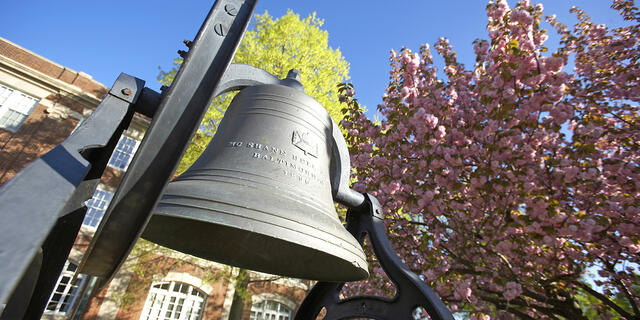
Legacy Gifts
When you include McDaniel College in your will, living trust or other long term charitable plans, you are making a commitment to the future of the College and creating a lasting, meaningful legacy for yourself.
About Legacy Giving
Is the College already named in your will or other plans?
Please call Lawrence “Chip” Junkin MS ’15. All information is held in confidence.
Is it time to update your plans?
Please include a charitable bequest to McDaniel College by using the following bequest language for an unrestricted bequest:
"For the purpose of making a charitable gift I, (your name), do hereby gift and bequeath to McDaniel College (percentage of assets or specific amount). I have given these funds to be used for unrestricted purposes.”
For contingent, residual or other types of bequest language, please contact Lawrence “Chip” Junkin MS ‘15.
When you make a charitable planned gift to McDaniel College, you will be invited to join the Legacy Society. You may choose your gift remain anonymous, if you prefer.
Maximize your Retirement Plan
Many charitable-minded people support their favorite nonprofit organizations by making a gift with their IRA, 401k or other retirement plans.
IRA Distributions - RMD and QCD
If you are 70 ½ or better, you can make a direct, charitable gift to the College with your IRA. This is called a Qualified Charitable Distribution (QCD) and it’s a smart and wonderful way to make a charitable gift. Because your IRA distribution goes directly to the College, bypassing you, it lowers your adjusted gross income (AGI), effectively reducing your income taxes.
If you are 73 or better, you must take a Required Minimum Distribution (RMD) from your IRA, and your QCD can satisfy your RMD requirement. Currently, up to $105,000 in IRA funds can be counted as QCDs for an individual. The Secure 2.0 Act has also enabled individuals to use up to $53,000 to fund a Charitable Gift Annuity (CGA) with the College.
Beneficiary Gifts
Your IRA, 401k, 403b, TSP, or other retirement plan is a practical way to leave a legacy. You can name the College a full or partial beneficiary on a “change of beneficiary form.” Did you know retirement plans left to individuals or family trusts are some of the most heavily taxed upon death? Up to 70% of your plan’s value could be lost to taxes. Plus, under the SECURE Act enacted in December 2019, non-spousal beneficiaries (children, nieces/nephews, etc.) MUST take all proceeds within ten years. In the past, beneficiaries could stretch withdrawals over a lifetime. As a 501(c)(3) charitable organization, the College receives these same assets free of taxes.
Donor Advised Funds and Charitable Trusts
Do you have a Donor Advised Fund?
If you have a Donor Advised Fund (DAF) with a community foundation or charitable giving account with a financial institution like Fidelity, Vanguard, etc., please consider supporting the College, an eligible 501 c (3) nonprofit organization. You may be able to set up a recurring gift.
Charitable Trusts
Hard-earned assets are worth protecting and various charitable strategies safeguard family assets while providing security for loved ones and your favorite charities, like the College. Consider having a conversation with your advisors about whether a charitable trust is right for you. The two most common types are the Charitable Remainder Trust and Charitable Lead Trust.
Beneficiary Gifts
Brokerage or other accounts
Most people do not realize that they can leave assets from their accounts to their favorite charitable organizations. You may name a charity as a full, partial or contingent beneficiary to a brokerage, savings or other accounts. Simply fill out a “change of beneficiary form” offered by your account representative.
Life Insurance
Consider naming the College a beneficiary of an insurance policy. You can also leave a significant legacy by donating a paid-up policy you may have outgrown. Life insurance paid to a charity is not subject to Federal estate tax and you may be able to receive an income tax deduction for your premium payments.
Retirement Plans
Your IRA, 401k, 403b, TSP, or other retirement plan is a practical way to leave a legacy. You can name the College a full or partial beneficiary on a “change of beneficiary form.” Did you know retirement plans left to individuals or family trusts are some of the most heavily taxed upon death? Up to 70% of your plan’s value could be lost to taxes. As a 501(c)(3) charitable organization, the College receives these same assets free of taxes.